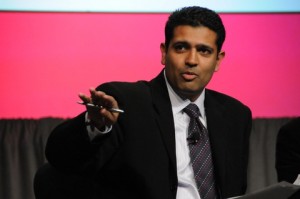 (Note from the editor: As reported earlier this week on AsAmNews, TV Week recently named Hari Sreenivasan to its “12 to watch” list for 2014. Sreenivasan is news anchor for the new PBS News Hour, Weekend. He is one of the few South Asian Americans or even Asian Americans to rise to the ranks of network news anchor. He agreed to answer the following questions from AsAmNews.)
(Note from the editor: As reported earlier this week on AsAmNews, TV Week recently named Hari Sreenivasan to its “12 to watch” list for 2014. Sreenivasan is news anchor for the new PBS News Hour, Weekend. He is one of the few South Asian Americans or even Asian Americans to rise to the ranks of network news anchor. He agreed to answer the following questions from AsAmNews.)
Tell us about yourself? Where were you born, raised, educated etcetera?
Born in Bombay, India (now known as Mumbai), raised there for my early life, then immigrated to the greater Seattle area, went to middle and high school there, and college at the University of Puget Sound.
Why did you decide to pursue journalism as a career?
It’s a license to stay curious. I have a broad range of interests, while I’m sure I could make the time pass working in accounts receivable at Midstate Office Supply, I can’t imagine a more rewarding occupation for someone who grew up asking “why” a lot. I’m not that great at + math.
How did your parents react to your career choice? Has it changed over time?
They thought it would be a phase. I was already on the air at our high school radio station playing music, so they didn’t think much of it. When I had interviews and offers at different stations, and I loaded everything I owned into the car, strapped my two bicycles on the back, I think they saw I was a bit more serious. When I was working in Raleigh, and I had a feature story turn up on CNN international, and one of their relatives or friends saw it, I think that’s when my parents realized, this was real.
What went through your mind when you were told about your selection by TV Week as one of 12 journalists to watch in 2014?
I was actually in India, and not checking email much. When I did check at night, I saw a flurry of messages in my Inbox and saw that Jam Sardar (news director at WLNS-TV in Lansing, MI) tagged me in a Facebook Post, so I actually didn’t read the article till several days later. I was pleasantly surprised. I didn’t know it was happening.
Please describe your career path and your ascent into the ranks of the network anchor chair.
I’m a bit old school in believing in the value of small and medium market television. I started out on air in Yakima Washington, grinding it out for a short time. I had a good resume tape which got me looks and interview in a few small markets; Allentown, PA, Madison, WI. and the place I landed in Raleigh, N.C. From there I left local news to focus on technology for CNET in San Francisco, then ran a production company of my own for a couple of years. Worked at ABC News from 2004-2007 out of New York, cycling through from anchoring at News Now, to reporting for News One(a news service for ABC stations) to reporting for Nightline, GMA, World News Tonight Weekend. Jumped to CBS to be a correspondent based out of Dallas for the Evening News, the Early Show, and CBS Sunday Morning. Came back to New York with CBS and then moved to the PBS Newshour in DC in the fall of 2009.
Please describe any times during your career in which you thought to yourself, I can’t keep doing this. If you’ve had moments like this, how did you keep persevering? If you haven’t had any moments like that, why do you think that’s the case?
I think there was a stretch where I was basically living out of a garment bag, and it was unpleasant. It just emphasized that this is a career that will take as much from you as you will give it, and you have to work hard to define some boundaries and preserve a sane personal life.
You are one of the few South Asian American and Asian American men to ascend to the ranks of news anchor at both the local and national level. What significance do you give that milestone and what responsibility, if any, do you feel to your community?
I think the responsibility shines through in situations like my recent trip to India, the perspective I brought to the stories we chose to shoot, or even the small matter of cash saved on interpreters in two separate states. Its one of those differences people begin to realize, that there is a different set of life experiences I bring to the table, and perhaps a different world view as a result. In my opinion diversity of thought is probably more important than that of skin color. What stories do you bring to the table at your morning news meetings? How do you add understanding and context to stories and help other reporters cover communities where you have more experience?
Why do you feel there are so few South Asian and Asian American men in the field of journalism?
I think the numbers are growing steadily. There were far fewer in the early 90s, when SAJA (South Asian Journalists Association) was born. I think it is an easier sell to South Asian parents but like most immigrant communities, the first generation likely struggled a bit to get here, and they want their kids to go into professions with more financial security.
Describe a moment in journalism in which you made a vital contribution and proud to be in your field?
I think there were a few pieces in the wake of Katrina that I was proud of. They didn’t win any big awards, but they made my producer and I proud to be there as witnesses to what was happening.
What advice would you give to someone who may be struggling in their careers right now, whether in journalism or another field?
Examine your rut, if you’re down in a pit, moving in any direction will only get you to a better place. Don’t be paralyzed by inaction. Life’s too short (unless of course you’re Hindu 😉 If you’ve got a great idea, it’s the execution that matters. What are you waiting for?


